Hi! I& #39;m attending today& #39;s Westside Community Conversation, a dialogue about recent public safety concerns between westside alderpeople, MPD Chief Vic Wahl, DA Ismael Ozanne, and other community leaders.
LIVETWEETS ARE IN THIS THREAD.
LIVETWEETS ARE IN THIS THREAD.
As per the flyer, here are our special guests and the meeting agenda!
People are trickling in; please stand by as we officially start at 5:30!
People are trickling in; please stand by as we officially start at 5:30!
Albouras is clarifying that this meeting is a follow-up to the Public Safety meeting which is being hosted to address public safety concerns, such as shots fired on the west side.
Harrington-McKinney is introducing the discussion by saying that "the key thing we want to move [in this conversation about public safety] is from discussion to actions."
She says we& #39;ll be discussing what public safety is about, and how we can get there.
She says we& #39;ll be discussing what public safety is about, and how we can get there.
Harrington-McKinney: "Some of you may be fearful, some of you may be disturbed -- there& #39;s some disturbing content [in this discussion] -- but these are all valid reactions and feelings. Let& #39;s be mindful and courteous of our conversations and our questions."
Alder Albouras introduced himself.
Alder Moreland seems absent.
Henak is introducing himself now.
Henak: "I& #39;m thoroughly impressed with how many citizens take an active role in this city."
Alder Moreland seems absent.
Henak is introducing himself now.
Henak: "I& #39;m thoroughly impressed with how many citizens take an active role in this city."
Skidmore will be joining us soon. (He apparently has a prior engagement that is running over?)
Moreland is here and introducing herself. Albouras thanks us all for being here.
All alders here tonight represent the west side and are neighboring alders of their fellow alderpeople.
All alders here tonight represent the west side and are neighboring alders of their fellow alderpeople.
Captain Patton is introducing himself now, thanking people for coming out despite COVID etc. (This is a virtual meeting, ofc.)
Patton says that this conversation will be about the three priorities of crime in this area: property crime, gun violence, and dangerous driving.
Patton says that this conversation will be about the three priorities of crime in this area: property crime, gun violence, and dangerous driving.
Captain Freedman is discussing recent reckless driving incidents, including the vehicular fatality at Grand Canyon.
Freedman: "[In our need to police these kinds of high-demand incidents,] we are being pulled and challenged by protest staffing and COVID."
Freedman: "[In our need to police these kinds of high-demand incidents,] we are being pulled and challenged by protest staffing and COVID."
Albouras is introducing Judge Mitchell.
Mitchell: "We need to face the seriousness of what we& #39;re facing," talking about the young people in the court system and addressing trauma of incarcerated young people. (Mitchell& #39;s discussing addressing core issues of the pipeline.)
Mitchell: "We need to face the seriousness of what we& #39;re facing," talking about the young people in the court system and addressing trauma of incarcerated young people. (Mitchell& #39;s discussing addressing core issues of the pipeline.)
Mitchell lays out responsibilities for legislative intent within the juvenile justice system, including protecting people from juvenile crime and prevent further delinquent behavior through facilitating competency in the juvenile. (I couldn& #39;t screencap 1-3, but here& #39;s 4-6.)
#7 is here:
Mitchell: "There are a lot of racial disparities in Madison. What we have to ask ourselves is: how are these disparities happening? Well, as much as people talk about the school-to-prison pipeline, what is operating in Dane is the child welfare-to-JJ-to-prison pipeline."
Mitchell says that "traumatized kids" are being passed around the child welfare system, receiving inadequate mental and physical healthcare, and then brought into the juvenile justice system that leads them further to prison.
Mitchell& #39;s Dane County pipeline presentation:
Mitchell: "We have no group homes in Dane County, so we have to send them to different communities away from families, resources, and scholarship that can help them. Limited foster placements for teens, too."
Mitchell: "We have no group homes in Dane County, so we have to send them to different communities away from families, resources, and scholarship that can help them. Limited foster placements for teens, too."
Mitchell: "We& #39;ve sent young people to care centers that have been physically, sexually, and mentally abused, and we& #39;re just finding out that trafficking victims in Dane County are being sent out [of the community] for & #39;care& #39; and then receiving even worse abuse."
Mitchell is now showing a clip of PBS& #39;s "Case in Point" documentary in order to "frame the conversation around juvenile justice."
Full video here: https://www.pbs.org/video/case-point-pqjo6n/">https://www.pbs.org/video/cas...
Full video here: https://www.pbs.org/video/case-point-pqjo6n/">https://www.pbs.org/video/cas...
Mitchell says the goal of this documentary was to demonstrate that "we& #39;re working to break this pipeline."
Mitchell also mentions that education -- literally, going to school -- is a huge part of caring for youth, yet they& #39;re frequently denied that care (see PowerPoint).
Mitchell also mentions that education -- literally, going to school -- is a huge part of caring for youth, yet they& #39;re frequently denied that care (see PowerPoint).
Mitchell wants to demonstrate that focusing the people that Mitchell works with every day, and the narratives they live, is "how we morally [address crime] ... throughout our entire state."
Now we& #39;re pivoting to Ozanne& #39;s comments.
Ozanne says that he& #39;s thankful for Mitchell& #39;s work: "he makes some very valid points."
Ozanne: "My role in the justice system is to uphold the constitution in the state of Wisconsin, and law enforcement reports to us."
Ozanne says that he& #39;s thankful for Mitchell& #39;s work: "he makes some very valid points."
Ozanne: "My role in the justice system is to uphold the constitution in the state of Wisconsin, and law enforcement reports to us."
Ozanne: "If we charge [from a referral from MPD], we give them their day in court, and work to prove the charges beyond a reasonable doubt.
"Here& #39;s what we don& #39;t do: decide pre-trial whether we will incarcerate."
"Here& #39;s what we don& #39;t do: decide pre-trial whether we will incarcerate."
Ozanne: "We inform the court so the court can make an informed decision. Now, with Marcy& #39;s law, victims have a right to speak and be present at any of their court hearings."
Ozanne: "When we talk about diversion in the juvenile system, human resources is the one [that handles diversion]. The juvenile system moves a lot faster than the adult system; custody determination is figured out within 24 hours."
(Ozanne& #39;s jumping around topics a bit. Apologies for sporadic reporting.)
Ozanne mentions that COVID is greatly impacting the ability to prosecute.
Ozanne: "I can answer your questions [about due process] but I cannot answer questions about open cases."
Ozanne: "I can answer your questions [about due process] but I cannot answer questions about open cases."
Ozanne is saying that a large amount of people in his history of prosecution that required incarcerated "[had] childhoods that were littered with abuse and neglect."
Ozanne: "If we can& #39;t protect children when we need to, why do we think they WON& #39;T move into the judicial system?"
Ozanne: "If we can& #39;t protect children when we need to, why do we think they WON& #39;T move into the judicial system?"
Ozanne: "So in a sense we& #39;ve failed them multiple times, to the point where we now feel we need to incarcerate them for /our/ safety. And we do know that incarcerating people doesn& #39;t necessarily make us safer. We need to think about our systems differently."
Ozanne: "If a child is prepared to learn, they will. They will strive and achieve great heights. You& #39;ve seen it in the children that you& #39;ve raised! But we need to say: how can we ensure that success? And one of the biggest ways is to talk about positive parenting."
Ozanne is advocating against physical discipline.
Ozanne: "We now know better. Now we must do better. (I wish I could claim that; I can& #39;t. That& #39;s Maya Angelou.)"
Ozanne: "We now know better. Now we must do better. (I wish I could claim that; I can& #39;t. That& #39;s Maya Angelou.)"
Ozanne: "So when Mitchell talks about the pipeline, we have the ability to do better, making sure resources are at the front of the system rather than the back of the system -- a system that doesn& #39;t keep us safe and doesn& #39;t address the issues that we& #39;re most concerned with.
Ozanne: "Some of the other things we& #39;re talking about is unrest. We& #39;re seeing peaceful protests, burgled businesses, graffiti ... [So that& #39;s another issue we& #39;re thinking about.]"
Some interesting comments from the immediate chat here:
Some interesting comments from the immediate chat here:
Chief Wahl is now speaking, thanking Mitchell and Ozanne for their work.
Wahl: "I want to elaborate on Freedman& #39;s priority issues and talk about things we& #39;re trying [as a PD] to address these issues."
Wahl: "I want to elaborate on Freedman& #39;s priority issues and talk about things we& #39;re trying [as a PD] to address these issues."
Wahl: "It& #39;s been an eventful year that I wound up in this position, from COVID to everything else that has happened this year -- truly a perfect storm for everyone in Madison. I& #39;ll come back to COVID because I think it has more of an impact than most have recognized."
Wahl: "On gun violence: I think it bears repeating that the levels of gun violence this year have been unprecedented. No other word for it. Thus far, we& #39;ve had this year almost 200 shots fired incidents, and that& #39;s about 90% increase from the same time period last year."
Wahl: "We& #39;ve had 46-some people struck by gunfire; officers have recovered over 800 shell cases. Those are bullets flying through our communities, often in exchange between cars, fired into occupied houses ... Every one of those bullets is gonna hit something."
Wahl: "If there was an easy answer to this, someone else would be doing this. The issue we& #39;re seeing with gun violence is not unique to us: it& #39;s happening all across the country, and something that many other PDs are struggling with."
Wahl: "We& #39;re in a much different position [during COVID]. We& #39;re not having these face-to-face conversations [and community outreach]. That& #39;s changed how we can prevent retaliation and gun violence."
Wahl: "You& #39;re probably wondering: what does public health have something to do with gun violence? There are plenty of communities across the country that are taking on the issue of gun violence from the perspective of public health." [He listed some cities, I promise.]
Wahl mentions that public health departments can be funded to address comprehensive approaches to gun violence.
Wahl: "Those efforts were in the early stages in Madison. Then the pandemic hit, and public health is [a bit bogged down right now, for obvious reasons]."
Wahl: "Those efforts were in the early stages in Madison. Then the pandemic hit, and public health is [a bit bogged down right now, for obvious reasons]."
Wahl is talking about the potential development of Focus Interruption Coalitions, or city employees that have connections and credibility in the city that can intervene in known disputes.
Wahl: "Disputes that were once solved with a fistfight are now solved with gunfire."
Wahl: "Disputes that were once solved with a fistfight are now solved with gunfire."
Wahl wants to touch on a few things that have been able to "divert people and use other means than the criminal justice system" to address crime, such as the restorative people& #39;s court, and youth programs that facilitate restorative justice rather than give city ord. citations.
Wahl: "The next month and a half in Madison, we& #39;ll be discussing the city budget process. That& #39;s something that citizens and members of the community can participate in, through your alders and the Mayor& #39;s office. Budget decisions have consequences; stay tuned into these convos."
More comments, including some pushback regarding the "root causes" rhetoric of Mitchell, Ozanne, and Wahl.
Anthony Cooper, CEO of Focus Interruption Coalition, is now speaking.
Cooper: "We respond to all gun violence that happens in our community to help families navigate, whether on the scene or at the hospital, [these difficult moments]."
Cooper: "We respond to all gun violence that happens in our community to help families navigate, whether on the scene or at the hospital, [these difficult moments]."
Cooper: "We do prevention and intervention, so we can have a different perspective -- we work with the [gun violence] perpetrator as well as the victim so we can give them a way out; a way to find balance in their own lives."
More comments. (None of these are cut off, btw: I have been intentionally starting each of these screenshots from the last screenshot& #39;s captured comment.)
Lisa Kass is now speaking.
Kass: "The information you& #39;ve given us is helpful and enlightening, and gives us a sense of what& #39;s happening our community. I see there& #39;s a big gap between reaching out to kids and facilitating their productive membership of society."
Kass: "The information you& #39;ve given us is helpful and enlightening, and gives us a sense of what& #39;s happening our community. I see there& #39;s a big gap between reaching out to kids and facilitating their productive membership of society."
Kass: "But my question is about the overabundance of gun violence in our community. I would like to see something done about preventing people from getting their hands on guns who should not have them. What can the City Council do about that?"
Harrington-McKinney: "That& #39;s a question that I don& #39;t know if we can answer at this time. Is there any other community member that could answer that question?"
Wahl: "One [issue] is that state law preempts municipalities from enacting any city gun restrictions. CC doesn& #39;t have authority to do any gun restrictions. I never thought people would walk up State St with rifles on their shoulders, but that& #39;s the world we live in."
I missed the other half of Wahl& #39;s comments. Here are some more.
Harrington-McKinney: "There& #39;s a sense that young people are not held accountable. Mitchell, can you speak to that?"
Harrington-McKinney: "There& #39;s a sense that young people are not held accountable. Mitchell, can you speak to that?"
Mitchell: "That& #39;s not true. We& #39;ve probably incarcerated more people in Lincoln Hills in the last 10 years than ever in Dane County. We& #39;ve put the high-risk individuals in custodial spaces and have hoped to give them support to achieve their goals. We& #39;ve done more than [ever]."
Mitchell: "You cannot always hold juveniles in custody when they& #39;re pending new cases. That& #39;s why you see a lot of people catch cases back to back before the system can place restrictions [on their behavior]."
Mitchell: "Also, remember that some of these kids literally don& #39;t have families. Dane County all needs to be sitting at the table to address the complexity of these issues."
Ozanne: "Here& #39;s the reality: the traditional criminal justice system is present, & it is still functioning. Okay? Law enforcement is still investigating and prosecuting. Before COVID, when a case was charged, it literally took about a year before the system worked up to a trial."
Ozanne: "Because we don& #39;t have trials, the system has STALLED. We& #39;re still trying to figure out where and how people can be held accountable and get connected to resources, b/c judges do not want to send more people into the jails and prisons and worsen the hotspots."
Ozanne: "The system is still working. What WE& #39;RE trying to talk about is: can you [citizens] get in front of it? My concerns are the 9 and 10-year-olds that are right now NOT in the system yet. If we can reach those kids, we can keep them [out of the system] TODAY."
Ozanne: "I understand that this [rhetoric] does not change your fears out on the streets. We are still asking for cash bail when we see there& #39;s a serious safety need, and we still see people incarcerated for over a year. But we cannot hold people indefinitely."
Juliana Bennett is now speaking.
Bennett: "It& #39;s been amazing to hear about these programs. I can say from my own experience being a UW student now, yet having grown up in low-income neighborhoods, I do know that these programs work and help kids."
Bennett: "It& #39;s been amazing to hear about these programs. I can say from my own experience being a UW student now, yet having grown up in low-income neighborhoods, I do know that these programs work and help kids."
Bennett: "Something I wanna point out that I haven& #39;t heard too much in this is that the people most affected by these issues are minorities, especially people of color, and their generational trauma. How are we looking to reallocate CoM resources to programs that help people?"
Ozanne: "I think Dane County is resource-rich. I think we need to have a discussion about public resources and how to allocate them sooner. 51% of our operating budget in Dane County is for human resources. This next budget is going to be different cause of COVID."
Ozanne: "If we look at where and how we& #39;re spending, we could probably reallocate some as to when we apply them, not necessarily that we have to totally switch [but rather an expedited process]."
Aurielle Smith, with Public Health, is speaking.
Smith says that Public Health is actively working on a plan to address gun violence, and also says that part of Public Health& #39;s core mission is to address those racialized realities.
Smith says that Public Health is actively working on a plan to address gun violence, and also says that part of Public Health& #39;s core mission is to address those racialized realities.
Sheray Wallace is now speaking.
Wallace: "I& #39;m currently working with FIC. They& #39;ve created a community safety worker position; I& #39;m one of those! And we& #39;re resources for the community to help resolve conflict through mediation which may prevent unnecessary police contact."
Wallace: "I& #39;m currently working with FIC. They& #39;ve created a community safety worker position; I& #39;m one of those! And we& #39;re resources for the community to help resolve conflict through mediation which may prevent unnecessary police contact."
Wallace: "We respond to low-level neighborhood conflict and police calls; the west district on Tuesday will have a briefing on [this process?], and we hope to eliminate some of these situations while decreasing police contact."
Amit Popat has three different questions/comments:
1) "Judge Mitchell had a nice list of things, but I would request the alderpersons gather that list of community actions given that we& #39;re looking for long-term and short-terms and help youth feel part of the community."
1) "Judge Mitchell had a nice list of things, but I would request the alderpersons gather that list of community actions given that we& #39;re looking for long-term and short-terms and help youth feel part of the community."
Albouras approves the idea of creating a website or public document that affirms the ideas that Mitchell suggested in the chat about how to create stronger community and youth relationships.
Amit Popat continues:
2) "Research shows that police de-escalation is a good option. You also made a plea for reacting to budgetary concerns; would you be willing to lay out a plan for how much of those resources would be used for de-escalation training of your officers?"
2) "Research shows that police de-escalation is a good option. You also made a plea for reacting to budgetary concerns; would you be willing to lay out a plan for how much of those resources would be used for de-escalation training of your officers?"
Wahl: "In terms of use of force encounters, we have SOPs on de-escalation and it& #39;s incorporated in a variety of our trainings and courses. I don& #39;t know if that it would be very easy to attach a particular dollar figure to it; it& #39;s incorporated into a number of our trainings."
Nobel Perez wants to bring up the fact that Mitchell says that "no group homes are available in Madison."
Perez: "Are there any incentives, whether economic or social, for publicizing programs that would house children? What could be done to help these programs become known?"
Perez: "Are there any incentives, whether economic or social, for publicizing programs that would house children? What could be done to help these programs become known?"
Harrington-McKinney: "I can speak to that. You can become a court-appointed juvenile advocate goes through a series of training under court supervision that allows you to basically act like a big brother mentor for a younger person [in the system]."
Harrington-McKinney is continuing the community/restorative/preventative rhetoric. "We want to be proactive in what we& #39;re facing now."
It doesn& #39;t seem like some of the chat is having it.
It doesn& #39;t seem like some of the chat is having it.
Cooper is speaking again about how they& #39;re trying to engage community members from outlying Madison-suburban communities (a la Verona).
Cooper: "Making sure we& #39;re not just having the conversation, but that we& #39;re taking action [across the city], helps so that we can all step in."
Cooper: "Making sure we& #39;re not just having the conversation, but that we& #39;re taking action [across the city], helps so that we can all step in."
Matthew Veldran is speaking. He& #39;s also roboting really badly.
Veldran: "Just want to mention what was announced today by the county executive."
We& #39;re having a hard time understanding him.
Veldran: "Just want to mention what was announced today by the county executive."
We& #39;re having a hard time understanding him.
Ozanne: "I think he was trying to say that the county exec put a press release out on a mental health triage and recreation center."
Bonnie Roe is now speaking.
Roe: "MPD asked for community suggestions. I want to follow up on that input. Also, in light of the violent crimes perpetrated by teens, how are high schools going to handle them now that SROs have been removed?"
Roe: "MPD asked for community suggestions. I want to follow up on that input. Also, in light of the violent crimes perpetrated by teens, how are high schools going to handle them now that SROs have been removed?"
Wahl: "Schools are not in session right now but we meet with the school district regularly, so we& #39;ve had long-standing partnerships and meetings regularly about safety planning, MPD response, and we& #39;ll be expanding that now to the high schools."
(I also missed the specifics of Wahl& #39;s addressing of the first question. Typing a lot, sorry. He basically just said "we& #39;re still contextualizing input" etc.)
Veldran is speaking again.
Veldran: "Yeah, Ozanne made the point that I was going to raise. And we& #39;re hoping that part of the whole that we& #39;re looking at within policing is this youth issue as well."
Veldran: "Yeah, Ozanne made the point that I was going to raise. And we& #39;re hoping that part of the whole that we& #39;re looking at within policing is this youth issue as well."
Gary Graper is speaking.
Graper: "From what I judge, not very many people are in favor of defunding the police or of cutting their budgets or anything like that. Yet when I watch the city council meetings, it sounds like the rest of the city alders are in favor of doing that."
Graper: "From what I judge, not very many people are in favor of defunding the police or of cutting their budgets or anything like that. Yet when I watch the city council meetings, it sounds like the rest of the city alders are in favor of doing that."
Graper: "Do we have different experiences on the west side that lead us to believe that defunding is the wrong way to go?"
Albouras: "I think that the question is very complex, but that said: the most important thing we can do is that it& #39;s not either/or."
Albouras: "I think that the question is very complex, but that said: the most important thing we can do is that it& #39;s not either/or."
Albouras: "We need to allocate resources to systems that promote public safety. I know that /I/ was awoken from shots fired in my own home. Acting like there isn& #39;t an issue of public safety in our district is in poor taste, in my view."
Albouras: "I think we need to make sure that we& #39;re allocating proper resources within our community. But at the same time, as you& #39;ve heard here in this conversation, law enforcement isn& #39;t the only solution to this. We need comprehensive solutions & upstream violence prevention."
Alder Evers is speaking to the question now too.
Evers: "That& #39;s a legitimate question. The term & #39;defunding the police& #39; has been hijacked; it& #39;s one that& #39;s not really effective anymore. The question we need to be asking is: what do we want the police to be doing?"
Evers: "That& #39;s a legitimate question. The term & #39;defunding the police& #39; has been hijacked; it& #39;s one that& #39;s not really effective anymore. The question we need to be asking is: what do we want the police to be doing?"
Evers: "We need to ask ourselves what is hoisted on the police that they& #39;re ill-equipped for. For example, mental health issues. We did not build up the resources to be able to help people years ago when we de-institutionalized Madison, but we DID bolster police departments."
Evers: "But was that the most important move we could have made? Defunding is about reimagining public safety and reallocating public resources. We want police to be the last resort, not the first resort, in all instances. If we make them the former, we& #39;re overburdening them."
Evers: "We can& #39;t afford to put a cop on every corner and prevent every one of these crimes. We need to do the focused interruption and focused deterrence and hotspot policing, and we need to address the root causes, and that& #39;s /not/ some kind of cliché."
Evers: "If we don& #39;t make sufficient investment in the lives of these kids, we& #39;re gonna pay for it in other ways. It& #39;s not so much & #39;defunding the police& #39; as it is & #39;refunding the body politic that will make a long-term difference in our society."
Moreland is speaking now.
Moreland: "I don& #39;t think I can put it any better than Evers did. When I heard & #39;defund,& #39; I thought; & #39;how are we ever gonna do that?& #39; I don& #39;t think we should call it defunding. I think we should call it reTHINKING the police."
Moreland: "I don& #39;t think I can put it any better than Evers did. When I heard & #39;defund,& #39; I thought; & #39;how are we ever gonna do that?& #39; I don& #39;t think we should call it defunding. I think we should call it reTHINKING the police."
Moreland: "We need more interventions; we need mental health people to ride along with police officers, for instance. We need to rethink [policing]. We can& #39;t call the police, but we have to call someone. & #39;Rethink& #39; the police is what I would call it."
Henak: "There are a lot of different areas we& #39;re looking at; how we& #39;re structuring our funding, etc. But I want to address the language of defunding. I don& #39;t know if it& #39;s been hijacked necessarily, but I think there& #39;s confusion around the term."
Henak: "There& #39;s a significant role for the Madison police department in our community. I think it& #39;s an important role; I think they do a lot of good work. I think that as Ozanne said, we are resource-rich, and I think we need to look at how we& #39;re distributing those resources."
Henak: "There are I think that we need to make sure that we& #39;re supporting the different services in our community, and one of those /is/ the police department."
Harrington-McKinney: "When I hear & #39;defund the police,& #39; I go, & #39;I don& #39;t wanna live in a community where there were none.& #39; So the use of that term was not one that I was comfortable with. But the description of resource allocation is a better question."
Harrington-McKinney: "But an even better question is this: police are often called to meet [people] at the worst day and time of their life. How do we want our police to show up?"
Harrington-McKinney: "I believe in community policing. When the police show up, they are expected to be the answer to every problem and situation that they come in contact with."
Harrington-McKinney: "In order to be proactive to public safety, we need to be looking at root causes. When you look at the social determinacy of health, that& #39;s how the Health Department solves health issues: what is the cause? They track that cause, and create solutions."
Harrington-McKinney: "There are [hundreds?] of people on this call. How many people show up to our CC meetings and step up to say, & #39;this is how I want my community to be?& #39; I would challenge [you all] to speak up and creating what the new Madison looks like."
Harrington-McKinney: "I am saying: use your voices and your power to say and make a difference. Gary, that& #39;s what I would say to you. It& #39;s not that you& #39;re different; it& #39;s that you& #39;re quiet, silent. Write a letter, send an email, make your voices known."
Henak is thanking the alders and presenters tonight.
The next conversation will be with Laura Larsen on budgetary concerns. Henak is asking for people to send questions on budget to district10@cityofmadison.com in preparation for that meeting.
Evers says: "Just a reminder: I lock my doors. I lock my car. I don& #39;t leave things in my car that they could use to get in my house. It may feel like an imposition because it wasn& #39;t common in the past, but these young people -- these are crimes of opportunity. Not gangs."
Evers: "These are kids who have fallen through the cracks. We can minimize the opportunity for them to [act] in this way. I& #39;m not trying to tell you anything you don& #39;t already know; just look out for one another, be kind to one another. There& #39;s unrest and hostility."
Evers: "It& #39;s good to remember that we& #39;re all in this together, and the most powerful force in the universe is love, including compassion and concern for everyone -- including those kids who are out there committing crimes."
Harrington-McKinney: "I& #39;m looking for a group of individuals who will help us with a marketing piece to remind our community to lock their doors, close their garages, etc. MPD has a lot of information, but this is community-driven: I& #39;m looking for a group to help make this."
Harrington-McKinney asks that, if you are interested in creating posters, stickers, or whatever else that can advertise to your neighbors to lock your doors and garages, email district1@cityofmadison.com.
Henak is imploring people in the chat to stay engaged with each other, especially in the COVID times. "It& #39;s going to be a rough winter, so get ready for it."
Captain Freedman is speaking.
Freedman: "It& #39;s gratifying to see so many people that are trying to make things better and solve problems. I think ultimately that that& #39;s our best path forward. We may not always agree nor fully understand the mechanisms, but [our vision is there.]"
Freedman: "It& #39;s gratifying to see so many people that are trying to make things better and solve problems. I think ultimately that that& #39;s our best path forward. We may not always agree nor fully understand the mechanisms, but [our vision is there.]"
Freedman: "I know that MPD and the midtown team will be rowing in [the direction of progress] even if the waters are pretty turbulent. So thank you all again."
Captain Patton: "I echo those sentiments. And thank you for everyone who& #39;s concerned about our future."
Comments:
Captain Patton: "I echo those sentiments. And thank you for everyone who& #39;s concerned about our future."
Comments:
Ozanne: "It& #39;s great to see the community engaged. Thanks to the alders who are putting together [these opportunities] in this new virtual world we are navigating."
Ozanne: "I know that some protest language is shocking: it& #39;s meant to be that. But we need to turn from the shock, which brings awareness, to action and long-term solutions so that Madison can continue to be one of the best places in the country to live."
Wahl thanked participants and alders. Albouras is closing with his appreciation as well.
Albouras: "These are some very complex issues. We may not all agree on the how-do-we-get there or the mechanisms, but I think that these conversations are important ways to move to action."
Albouras: "These are some very complex issues. We may not all agree on the how-do-we-get there or the mechanisms, but I think that these conversations are important ways to move to action."
Meeting adjourned.

 Read on Twitter
Read on Twitter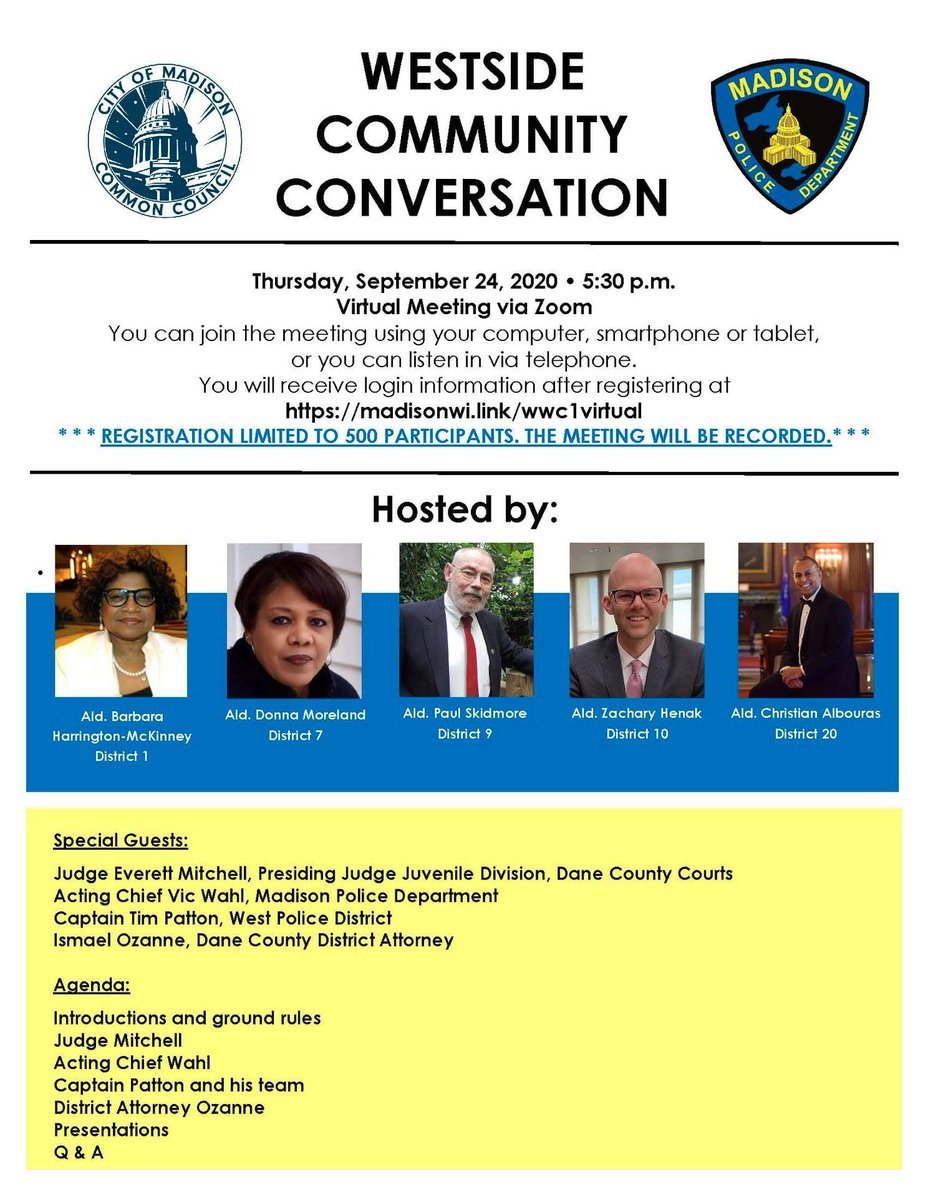

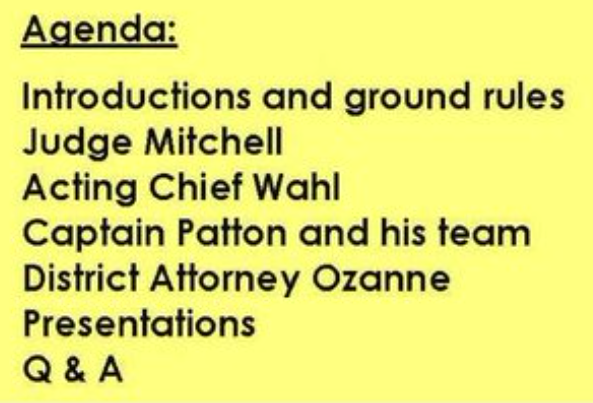
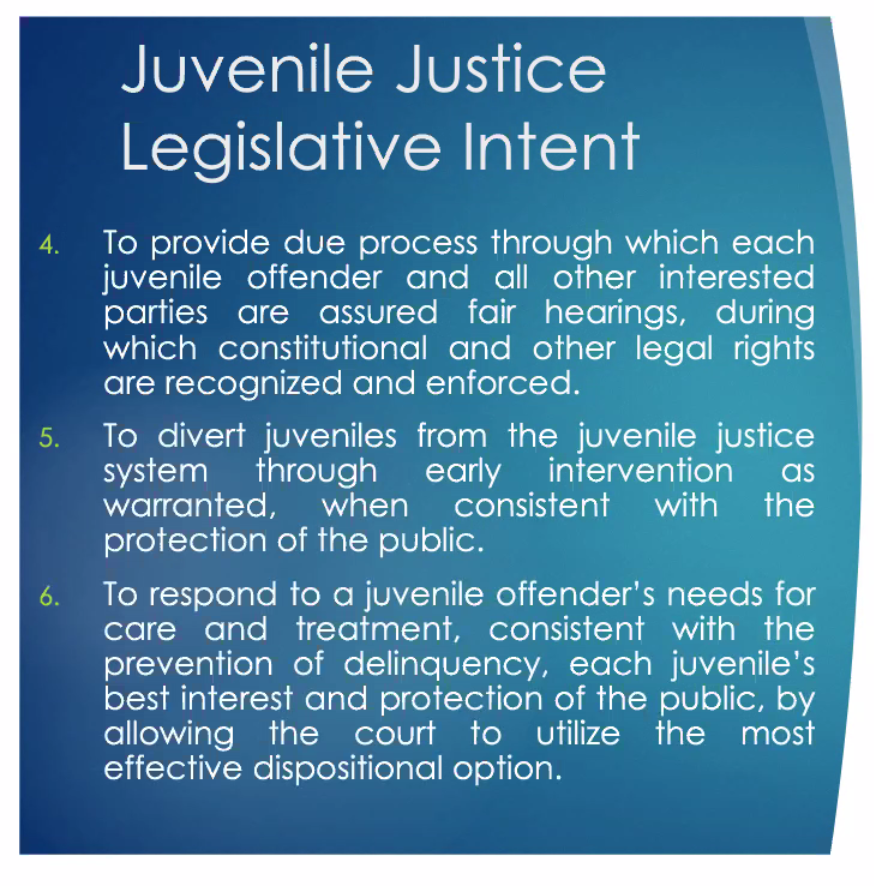
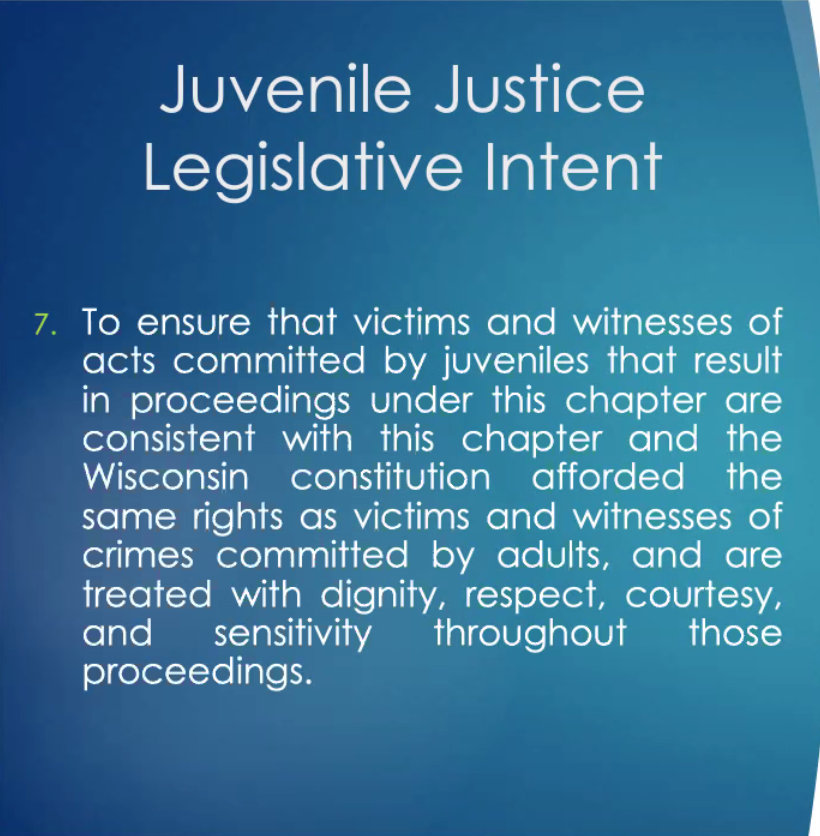
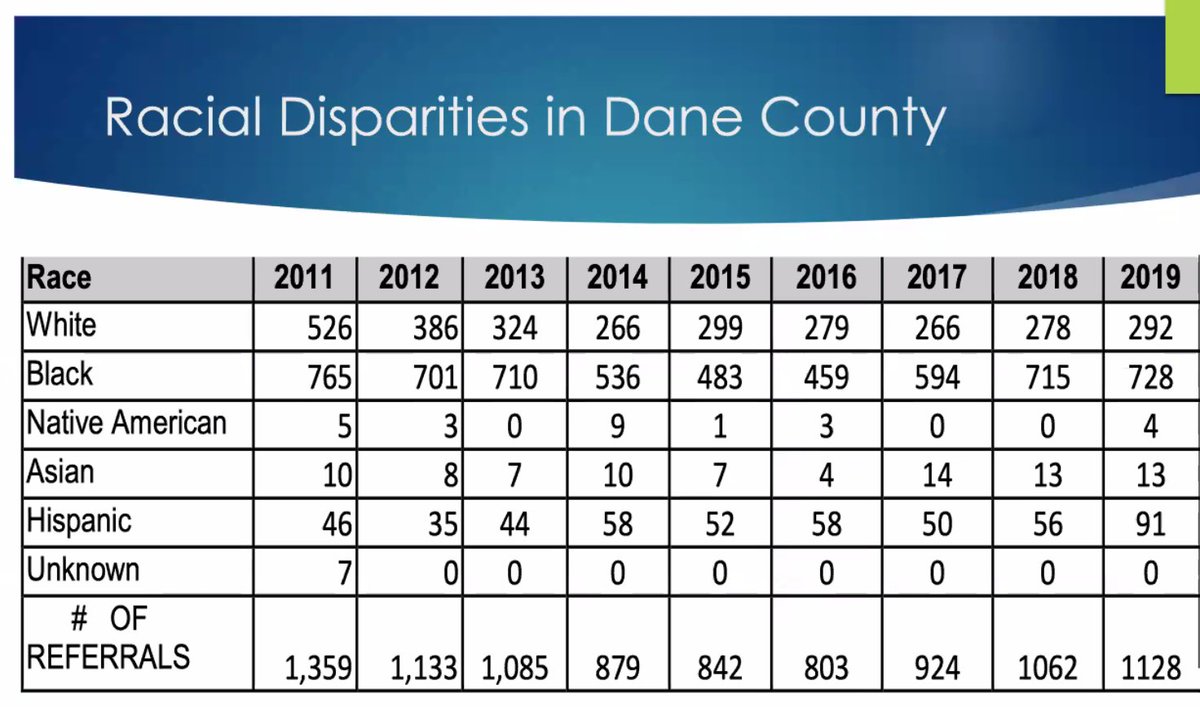
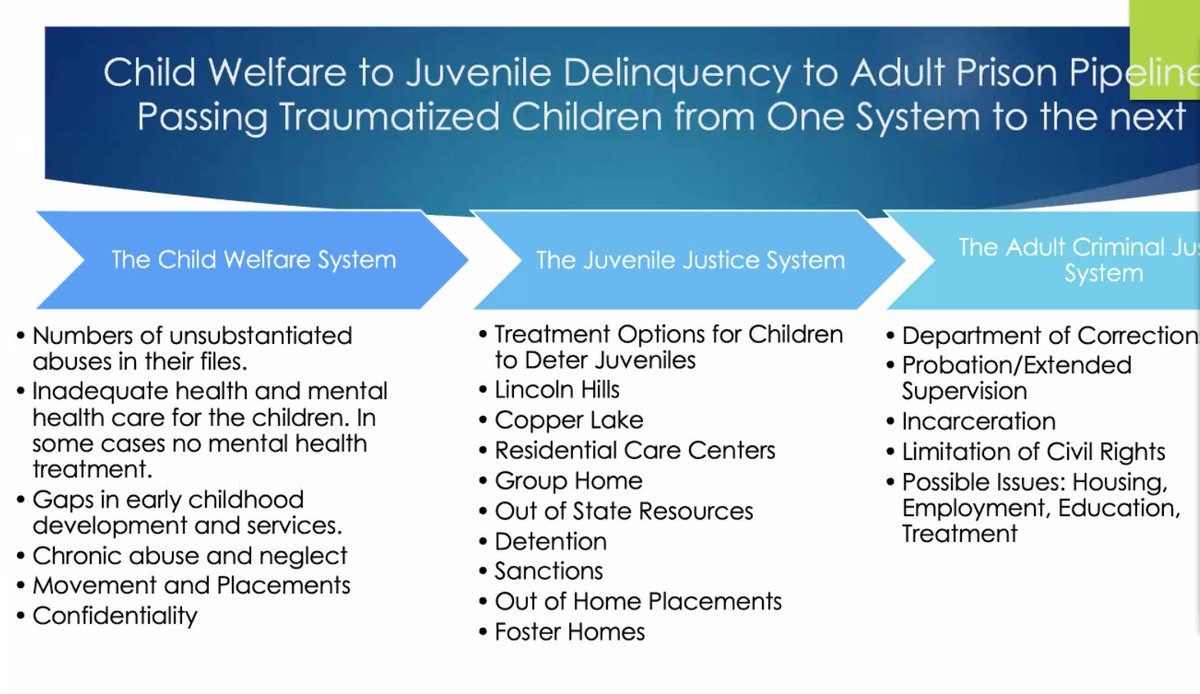
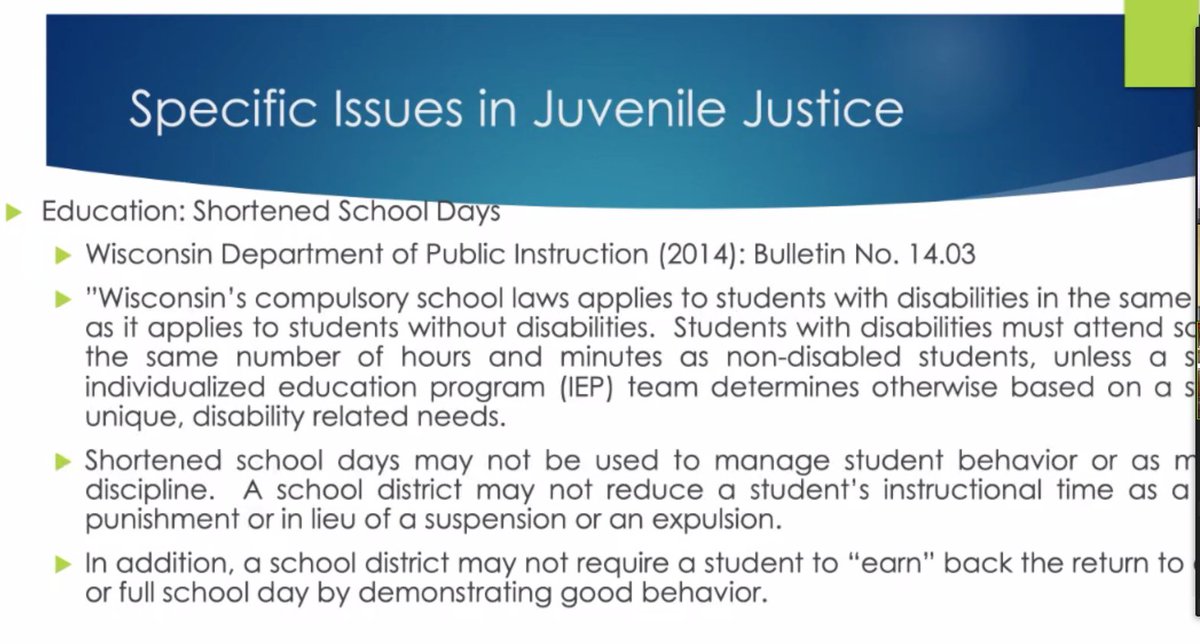
![Ozanne: "Some of the other things we& #39;re talking about is unrest. We& #39;re seeing peaceful protests, burgled businesses, graffiti ... [So that& #39;s another issue we& #39;re thinking about.]" Some interesting comments from the immediate chat here: Ozanne: "Some of the other things we& #39;re talking about is unrest. We& #39;re seeing peaceful protests, burgled businesses, graffiti ... [So that& #39;s another issue we& #39;re thinking about.]" Some interesting comments from the immediate chat here:](https://pbs.twimg.com/media/Eit5ulpWoAIezNV.png)
![Chief Wahl is now speaking, thanking Mitchell and Ozanne for their work.Wahl: "I want to elaborate on Freedman& #39;s priority issues and talk about things we& #39;re trying [as a PD] to address these issues." Chief Wahl is now speaking, thanking Mitchell and Ozanne for their work.Wahl: "I want to elaborate on Freedman& #39;s priority issues and talk about things we& #39;re trying [as a PD] to address these issues."](https://pbs.twimg.com/media/Eit6MsxXcAAqrMO.png)
![Wahl: "We& #39;re in a much different position [during COVID]. We& #39;re not having these face-to-face conversations [and community outreach]. That& #39;s changed how we can prevent retaliation and gun violence." Wahl: "We& #39;re in a much different position [during COVID]. We& #39;re not having these face-to-face conversations [and community outreach]. That& #39;s changed how we can prevent retaliation and gun violence."](https://pbs.twimg.com/media/Eit7EYyXsAMy183.png)


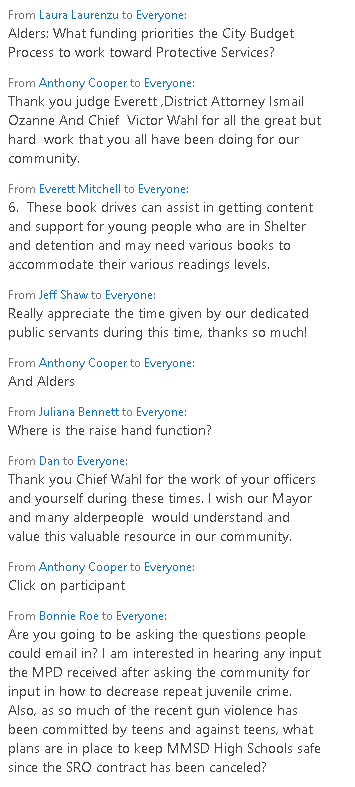
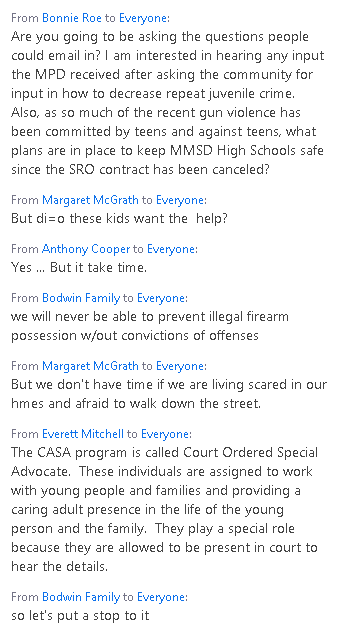

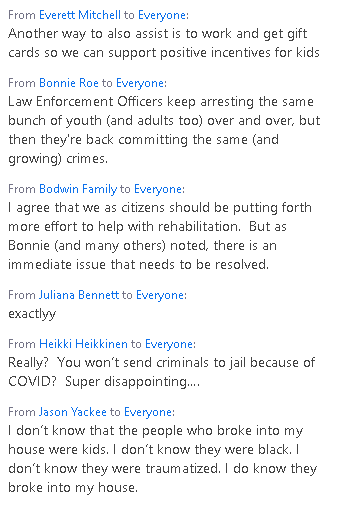
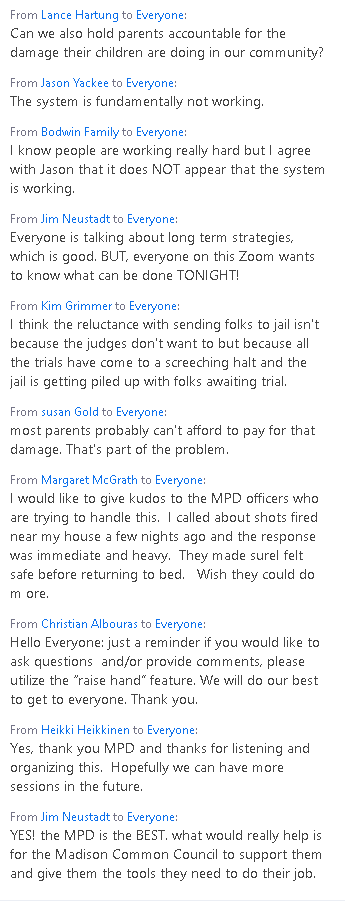

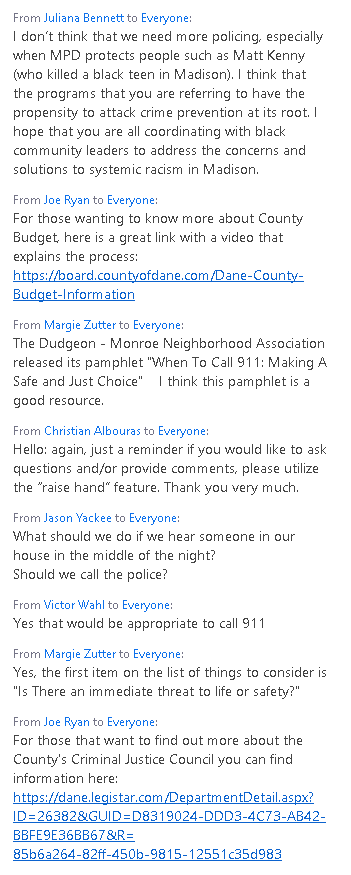
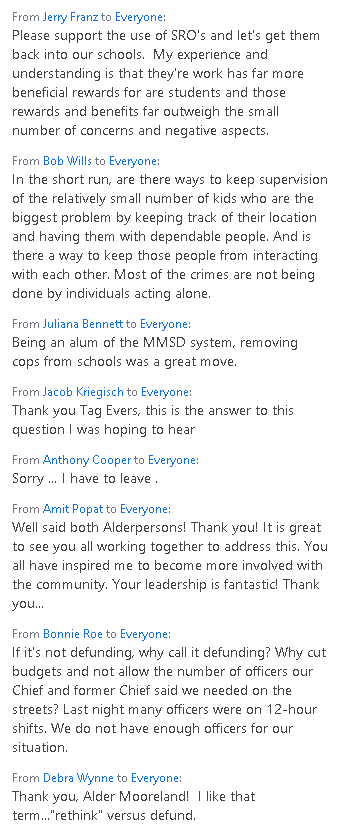
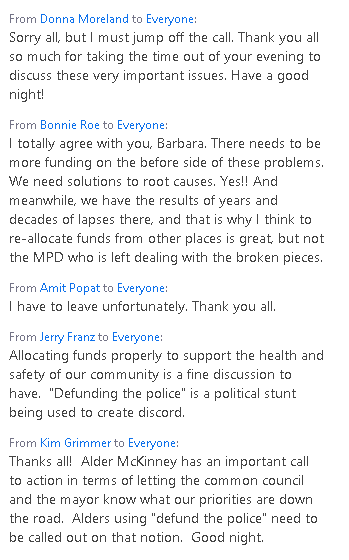
![Freedman: "I know that MPD and the midtown team will be rowing in [the direction of progress] even if the waters are pretty turbulent. So thank you all again."Captain Patton: "I echo those sentiments. And thank you for everyone who& #39;s concerned about our future."Comments: Freedman: "I know that MPD and the midtown team will be rowing in [the direction of progress] even if the waters are pretty turbulent. So thank you all again."Captain Patton: "I echo those sentiments. And thank you for everyone who& #39;s concerned about our future."Comments:](https://pbs.twimg.com/media/EiuMoyuXcAAcCfv.png)


